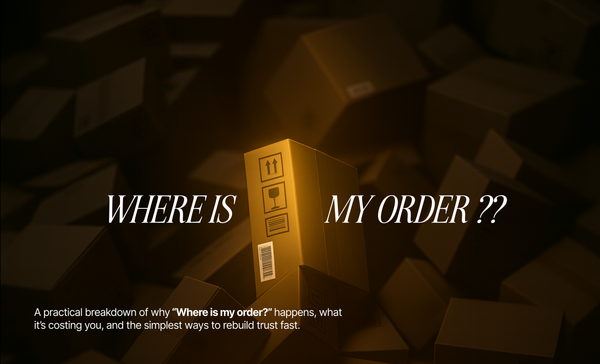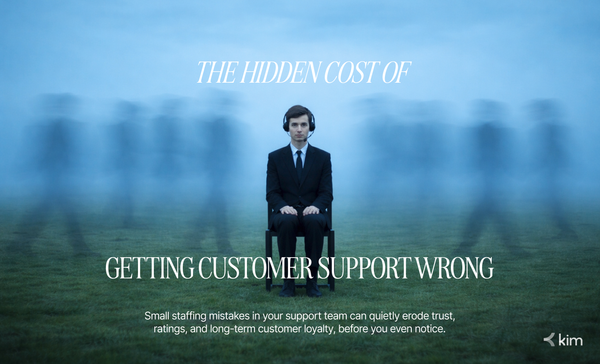10 Ways Customer Support Becomes Your Secret Weapon for DTC Brand Growth

Customer experience is king in the competitive world of Direct-to-Consumer (DTC) e-commerce. The significance of establishing trust and loyalty online is underscored by the startling statistic that 86% of consumers [Source: Zendesk] are willing to pay extra for an excellent customer experience. However, DTC brands confront a distinct difficulty because they lack actual stores and in-person contacts. Customer service representatives are the unsung heroes in this situation because they have the ability to turn client encounters into a platform for long-term, steady growth.
Key Takeaways
- How does customer service help a business?
- Why is customer satisfaction important in E-commerce?
- What are the 7 qualities of Good Customer Service
- 10 ways to scale your business through Customer Service
How Does Customer Service Help a Business?
Exceptional customer service goes beyond resolving issues. It fosters a sense of trust and builds brand loyalty, translating into positive reviews and increased customer lifetime value (CLTV). A study by Bain & Company revealed that a 5% increase in customer retention can lead to a profit increase of 75% [Source: Bain & Company], underlining the financial impact of happy customers. These satisfied customers become brand advocates, spreading positive word-of-mouth and boosting organic reach through online reviews.
Why is Customer Satisfaction Important in E-commerce?
Unlike traditional retail, DTC brands lack physical interaction with customers. This absence of in-person touch makes outstanding customer service even more critical. It bridges the gap between brand and buyer, fostering a sense of connection and personalized care that keeps customers coming back for more.
What Are the 7 Qualities of Good Customer Service?
Here are the seven pillars of exceptional customer service that DTC brands should prioritize:
- Empathy: Customer service agents should be able to understand and connect with customer frustrations and concerns.
- Active Listening: Truly listening to a customer's issue goes a long way in resolving it quickly and effectively.
- Product Knowledge: In-depth knowledge of your products empowers agents to provide accurate and helpful information.
- Problem-Solving Skills: The ability to identify the root cause of a customer's issue and present solutions is key.
- Clear Communication: Concise and transparent communication fosters trust and ensures the customer feels understood.
- Friendliness & Professionalism: A positive and professional demeanor leaves a lasting impression.
- Patience: Understanding that some customers might be frustrated requires patience and a calm approach.
10 Ways to Scale Your Business Through Customer Service
Now that we've established the importance of excellent customer service, let's delve into 10 actionable ways to leverage your customer support team as a strategic tool for scaling your DTC business:
1. Invest in Your Customer Service Agents
Your customer service agents are the face of your brand. Invest in their training and development by providing comprehensive product knowledge training, communication skills workshops, and customer service best practices seminars. Well-trained agents are empowered to handle complex inquiries with confidence, leading to faster resolution times and happier customers (73% of customers say that valuing their time is important in customer service [Source: Zendesk]).
2. Offer Multiple Customer Support Channels
Today's customers expect convenience. Provide a variety of support channels such as live chat, email, phone support, and social media messaging to cater to diverse customer preferences. This ensures customers can reach you on their preferred platform, minimizing frustration and expediting issue resolution.
3. Empower Agents to Resolve Issues Independently
Equip your agents with the resources and authority to resolve customer issues independently. This eliminates the need for constant escalation and streamlines the customer service process. Consider implementing a tiered support system where complex issues requiring supervisor intervention are clearly defined.
4. Leverage Technology for Efficiency
Technology is your friend in scaling customer service. Explore solutions like CRMs (Customer Relationship Management) that consolidate customer data and communication history. Implement self-service options such as knowledge bases and FAQs to empower customers to find answers independently, freeing up your agents for more complex inquiries.
5. Proactive Customer Support
Don't wait for customers to reach out with issues. Be proactive by anticipating their needs. Send automated order confirmation emails, shipping updates, and post-purchase follow-up messages to ensure customer satisfaction.
6. Gather Customer Feedback and Act On It
Feedback is a goldmine of insights. Actively solicit customer feedback through surveys, post-interaction ratings, and social media comments. Analyze this data to identify areas for improvement and implement changes based on customer sentiment.
7. Personalize the Customer Service Experience
A generic, one-size-fits-all approach won't cut it. Leverage the power of customer data to personalize the support experience. Address customers by name, reference past purchase history, and tailor solutions to their specific needs. This fosters a sense of connection and builds brand loyalty.
8. Embrace Social Media for Customer Service
Social media is a powerful platform for customer service. Designate a team to monitor brand mentions and promptly respond to customer inquiries and concerns on social media platforms. Publicly addressing issues demonstrates transparency and a commitment to customer satisfaction. Additionally, social media can be used to share helpful content, answer frequently asked questions, and showcase positive customer experiences, further strengthening your brand image.
9. Turn Customer Service into a Marketing Opportunity
Exceptional customer service experiences can be powerful marketing tools. Encourage satisfied customers to leave positive reviews on your website, social media pages, and trusted online marketplaces. Share heartwarming customer testimonials and success stories to build trust and attract new customers. Remember, happy customers are your best brand ambassadors.
10. Metrics: Measure What Matters
Data is king when it comes to scaling your customer service strategy. Track key metrics like customer satisfaction scores (CSAT), First Contact Resolution (FCR) rates, and average resolution times to identify areas for improvement. Regularly analyze these metrics to identify trends and make data-driven decisions to optimize your customer service operations.
By prioritizing these 10 strategies, you can transform your customer support team from a cost center into a strategic growth engine for your DTC brand. Remember, happy customers are loyal customers, and loyal customers are the cornerstone of sustainable success in the competitive world of e-commerce.
Struggling to address customer tickets? Kim virtual assistants are your secret weapon for success. Designed specifically for direct-to-consumer businesses, Kim seamlessly integrates with your workflow, boosting your efficiency and helping you achieve your goals. Book a demo now.



